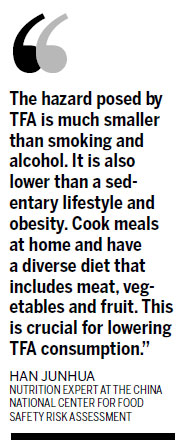Trans fatty acids in diets at acceptable levels
Updated: 2013-03-20 07:15
By Wang Qingyun (China Daily)
|
||||||||

Trans fatty acids pose much less of a threat to Chinese people than the public has been led to believe, a national-level food safety center said on Monday.
Starting 2011, the China National Center for Food Safety Risk Assessment assessed Chinese consumption of TFA in response to concerns about its levels in Chinese diets.
The study found that Chinese intake of the unsaturated fat is much lower than the limit recommended by the World Health Organization.
The WHO recommends that TFA should take up no more than 1 percent of a person's total energy intake, no more than 2.2 grams per day.
TFA can be found in dairy products and margarine, which is partially hydrogenated vegetable oil and widely used in fast food and baked goods such as cookies, cakes and chocolate. Regular consumption of high amounts of TFA can raise the risk of cardiovascular diseases.
The center tested 2,613 food samples collected in Beijing, Guangzhou, Xi'an, Chengdu and Shanghai, and followed the eating habits of more than 10,500 people in Beijing and Guangzhou over three days. The study found that TFA takes up on average 0.16 percent of the total energy intake of people in those five cities.
Even in Beijing and Guangzhou, where higher levels are consumed, TFA accounts for only 0.34 percent of the people's total energy intake, "far lower than the WHO recommends", the center said.
One reason behind the low TFA consumption is the typical Chinese diet, which involves fewer dairy products, such as cheese, than is common in many other countries, said Liu Zhaoping, a researcher at the center.
According to the study, almost half of the TFA in Chinese diets comes from refined vegetable oil, including canola oil, soybean oil, sunflower oil, peanut oil and corn oil. Another 29 percent comes from unprocessed foods such as milk and beef. Less than 15 percent comes from bread, cookies and cake.
Despite the low intake of TFA, the center has found other concerning results.
"We found that cream, butter and margarine contain very high TFA," said Li Jianwen, a researcher at the center. "Our test results show that there is up to 10.34 grams of TFA in 100 grams of margarine. There is at most 5.05 grams of TFA in 100 grams of cream or butter."
Wafers and sandwich biscuits also contain high TFA, he said.
In 2010, Zhuang Wei, who was then a CPPCC National Committee member, submitted a proposal suggesting the government restrict the amount of TFA permitted in processed foods and require food companies to report the amount of TFA on the food packaging.
In November 2010, China Central Television aired a news investigation, calling TFA in margarine and partially hydrogenated vegetable oil a "time bomb" posing a huge threat to human health. The report prompted heated public discussion, leading to the survey on TFA conducted since 2011.
China's food packaging regulations require that from packages of processed foods containing hydrogenated oil must display the amount of TFA. The amount of TFA can be labeled as nil if there is less than 0.3 gram per 100 grams of food.
About 70 percent of the 2,613 samples have less than 0.3 grams of TFA per 100 grams of food, so most foods Chinese people consume contain an "acceptable" level of TFA, Li said, but a small number of foods contain more than 2.4 percent of TFA.
"The government and industry should work to reduce TFA in such foods," he said.
Fu Hong, associate professor at the college of biological science and technology at Fuzhou University, said she believed the regulation has prompted domestic food companies and oil makers to change their processes, leading to a lower level of TFA in food.
Between 2005 and 2009, Fu and her team tested the amount of TFA in 167 samples of 52 famous brands of processed food sold in China. The test found that some brands of wafer and pie contained up to more than 6 percent of TFA.
"This year, I found on the food packages of these brands that the amount of TFA is 0 or very low," she said. "The largest maker of hydrogenated oil in China also started to significantly reduce its production and switch to other products."
People who have a balanced diet need not worry too much about TFA intake, said Han Junhua, a nutrition expert at the center.
"The hazard posed by TFA is much smaller than smoking and alcohol. It is also lower than a sedentary lifestyle and obesity," she said. "Cook meals at home and have a diverse diet that includes meat, vegetables and fruit. This is crucial for lowering TFA consumption."
wangqingyun@chinadaily.com.cn
(China Daily 03/20/2013 page4)

 In Photos: 7.0-magnitude quake hits Sichuan
In Photos: 7.0-magnitude quake hits Sichuan
 Li Na on Time cover, makes influential 100 list
Li Na on Time cover, makes influential 100 list
 FBI releases photos of 2 Boston bombings suspects
FBI releases photos of 2 Boston bombings suspects
 World's wackiest hairstyles
World's wackiest hairstyles
 Sandstorms strike Northwest China
Sandstorms strike Northwest China
 Never-seen photos of Madonna on display
Never-seen photos of Madonna on display
 H7N9 outbreak linked to waterfowl migration
H7N9 outbreak linked to waterfowl migration
 Dozens feared dead in Texas plant blast
Dozens feared dead in Texas plant blast
Most Viewed
Editor's Picks

|

|

|

|

|

|
Today's Top News
Live report: 7.0-magnitude quake hits Sichuan, heavy casualties feared
Boston suspect cornered on boat
Cross-talk artist helps to spread the word
'Green' awareness levels drop in Beijing
Palace Museum spruces up
First couple on Time's list of most influential
H7N9 flu transmission studied
Trading channels 'need to broaden'
US Weekly

|

|







